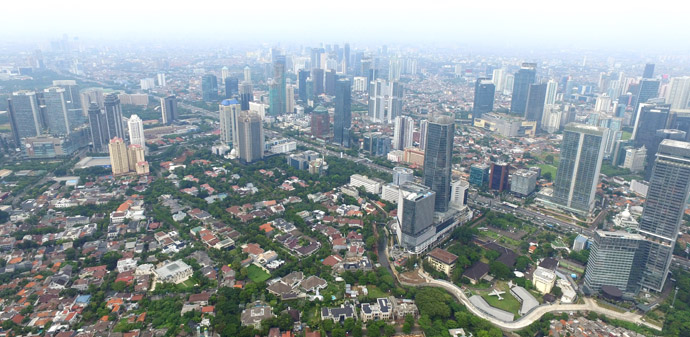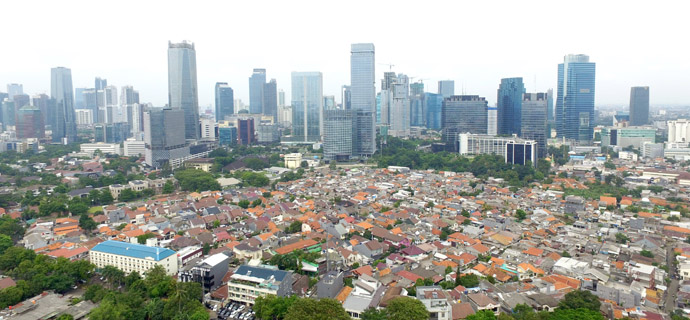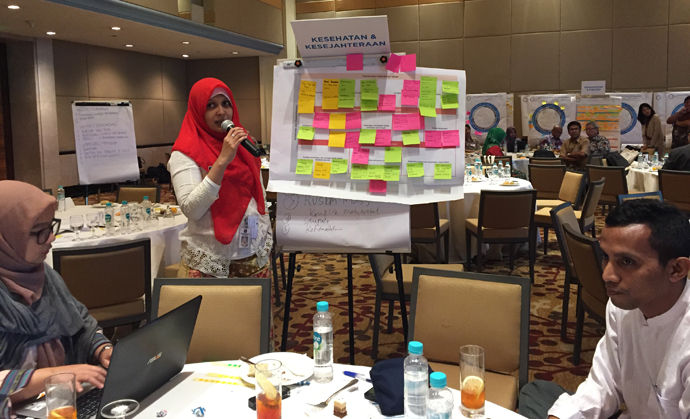Resilient Jakarta: Keeping above water
This is the second in a series of posts on AECOM’s work with cities participating in the 100 Resilient Cities program, pioneered by the Rockefeller Foundation. The program supports 100 cities globally in tackling issues of globalization, urbanization and climate change by developing a resilience strategy under the leadership of a chief resilience officer. AECOM has assisted eight cities that have already published their resilience strategies and is currently working with another 22. Stay tuned for more reports from our team!
Jakarta is an incredible, vibrant and growing megalopolis of over 32 million people. It’s the gateway to the Indonesian archipelago, a diverse and sprawling Muslim-majority democracy of over 280 million people. Indonesia has a rich history of engagement, migration and trade across the region, dating back to the Fourth Century, including over 300 years of Dutch colonialism, followed by independence after World War II. This history has endowed Jakarta with great ethnic, architectural and cultural diversity whilst making it dynamic and ever-changing. Many of the city’s streets and squares reflect Dutch urban planning. Buzzing neighbourhood markets combine traditional day-to-day shopping with hipster coffee. The city has a deep culture of religious tolerance exemplified by the national motto “Bhinneka Tunggal Ika” – “Unity in Diversity”.
 Photo by Caroline Febriyani, AECOM
Photo by Caroline Febriyani, AECOM
This diversity, vibrancy and complexity are what struck me immediately during my recent visit to help lead 100RC’s first engagement in Jakarta – its agenda setting workshop. Jakarta is a city struggling with many of the symptoms of rapid urbanisation, increasing globalisation and climate change. At the beginning of its journey to complete its first resilience strategy, drawing from these strengths whilst learning from its peers in the 100RC network will be critical.
Greater Jakarta’s population has grown by 22 million people over the last 45 years and is likely to add another 10 million in the next 10 years. We learnt during the workshop that meeting the basic needs of these new residents has been a massive challenge, and providing essential services like healthcare, drinking water, wastewater treatment and energy in the context of this growth will continue to be an enormous challenge.
 Photo by Caroline Febriyani, AECOM
Photo by Caroline Febriyani, AECOM
Jakarta has some of the worst traffic congestion in the world. Although significant investments in mass rapid transit are underway, matching transport investment with its population growth rate feels like an almost overwhelming task. Many other cities in the 100RC network are struggling with similar or, in the case of Mexico City, worse traffic. Learning with each other, sharing successes and helping to avoid repeating mistakes, so their residents can spend less time in traffic and more time living their lives, will be an important benefit of Jakarta’s 100RC network membership.
Flooding is also a regular part of life in Jakarta. The city is subsiding at a rate of 5-10 cm per year, with some areas experiencing rates of 30 cm per year. When added to sea level rise, average rainfall of close to 400 mm per month in January and February, clogged drainage canals and aging infrastructure, many areas of Jakarta are frequently under water. The workshop identified that continuing to invest in improved infrastructure and maintenance whilst learning to live with water should be key parts of further building Jakarta’s resilience. Many other cities in the 100RC network share these challenges, perhaps most pertinently Bangkok. Bangkok’s resilience strategy (due to be launched 16 February) will strongly focus upon the cultural challenges of changing the city’s relationship with water.

Not surprisingly, given Jakarta’s size and importance, it has been the focus of innumerable technical studies into its issues and opportunities. Completed by various Indonesian national and local government departments, international donors, multilateral agencies and non-government organisations, together these studies provide an overlapping and detailed understanding of Jakarta’s many challenges. However, for Jakarta’s decision makers this degree of focus creates a challenge in itself – how to navigate through these studies and prioritise what to do, given existing constraints. The broad-based, independent and practical while aspirational nature of the 100RC programme provides a unique opportunity to achieve this. The workshop provided a great start, bringing together people from across the private and public sectors, civil society, and academia, helping to develop a common language around resilience and common understanding of Jakarta’s resilience challenges.
Maintaining this momentum and continuing to demonstrate the value of taking a resilience-based approach to rethinking many of Jakarta’s challenges and opportunities will help ensure that the city’s 100RC journey fundamentally transforms its communities’ resilience.






